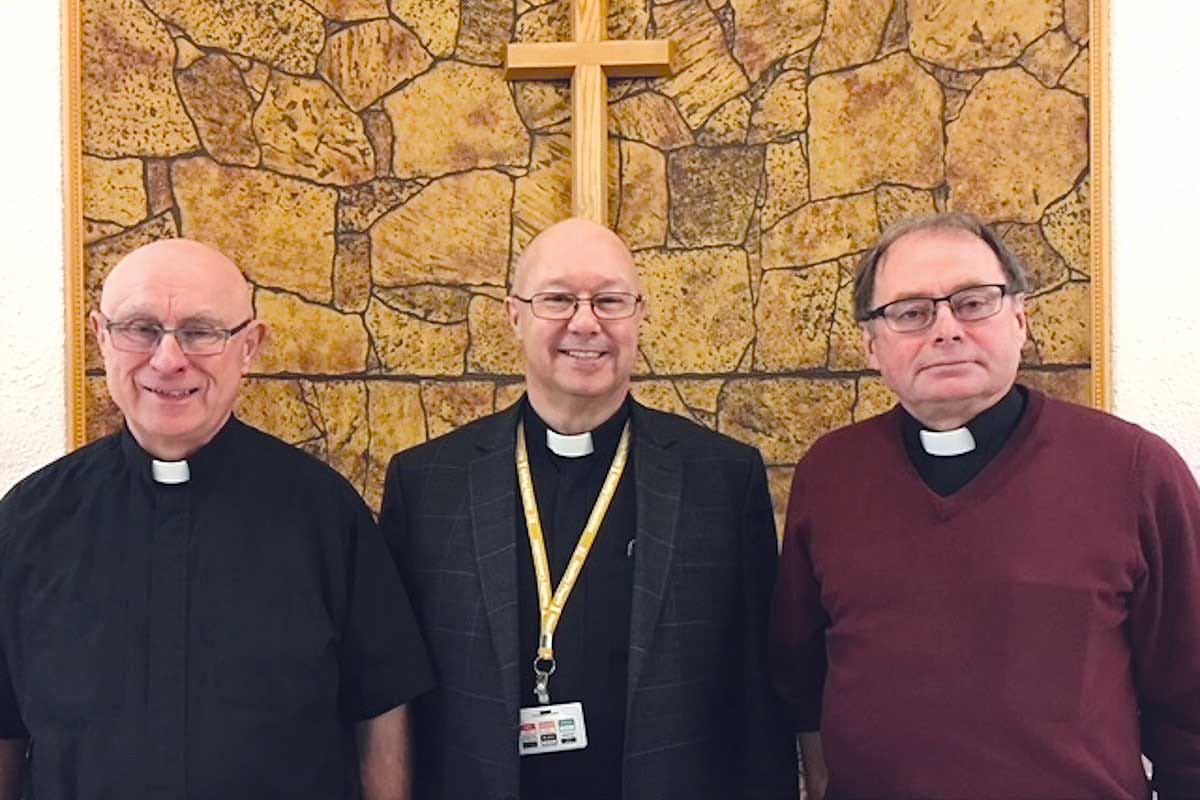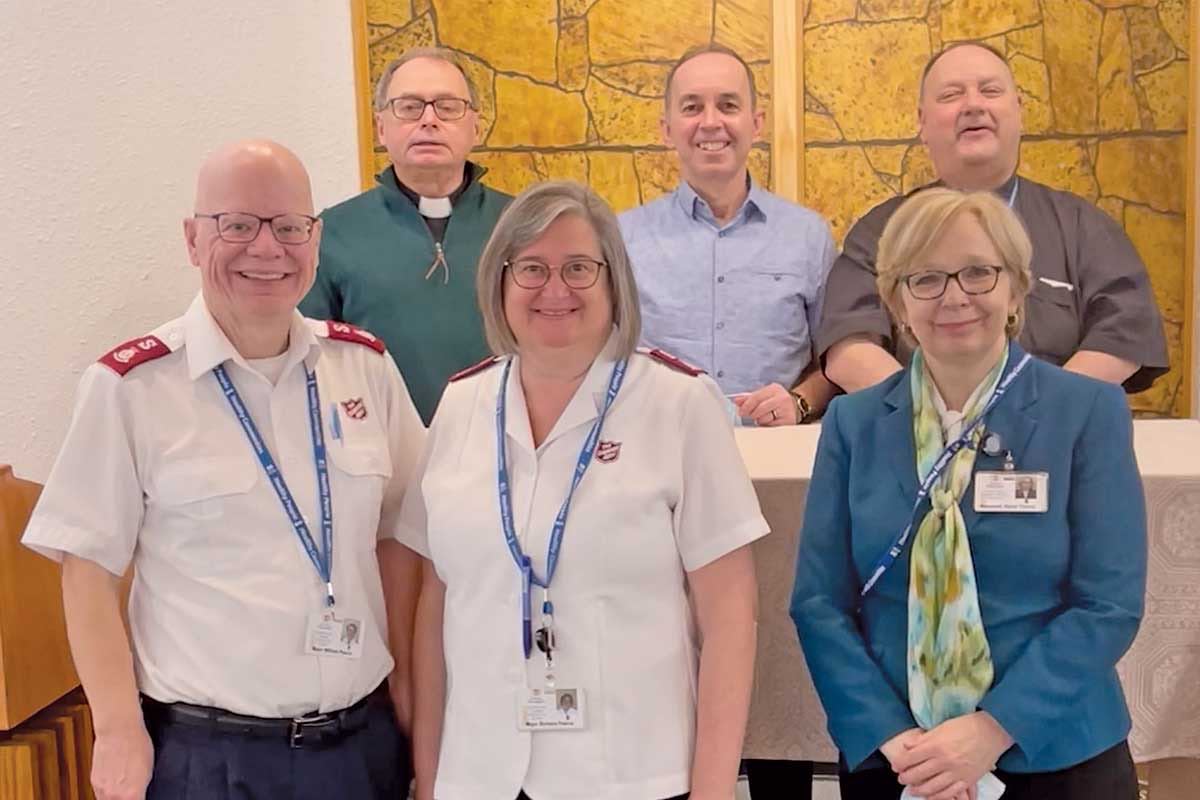The Anglican chaplaincy has seen some major changes over the past twenty months while the pandemic has been a part of our lives.
At the beginning of the pandemic in March 2020, the hospital system was closed for a period of time to family members and visitors. Clergy who worked in the Health Science Centre were asked to assist in other hospitals and care homes in the city. Only two chaplains were ministering for a long period of time at the Health Sciences Centre: Father Francis Roche, the Roman Catholic chaplain, and me as the Anglican chaplain. My responsibility, at the time, was to visit all faith community patients on the fifth floor and the HVICU. Most of these patients were waiting for heart surgery so I was able to minister to them from the time they entered the hospital to the time they returned home. Father Roche was responsible for the fourth floor, ICU and CCU, as well as the emergency department. We were permitted on another floor if a patient needed the sacrament of anointing or was dying. The response from all patients was very positive because they were only seeing the chaplain or nurse throughout the day. As time progressed, the Salvation Army chaplain, Major Barbara Pearce, came back to assist us in this ministry. Later, all chaplains returned to their normal workplace until another surge in COVID-19 cases occurred and the hospitals were closed down again and we reverted to the previous arrangement for two chaplains. In the meantime, the Rev’d David Pilling, the second Anglican Chaplain in the health care system, was posted full-time at Pleasant View Towers. At times, I would visit St. Clare’s and the Miller Centre on behalf of Rev’d David. The policy for this time was that we couldn’t go into an acute care and then visit a long-term care home. Because I was already working in an acute care facility I was permitted to visit other acute care facilities. Rev’d David was ministering in a long-term care facility and had to stay there for the duration.
The reason that the Salvation Army chaplains were not at the hospital during lockdowns was so that they could work from home, and then be available to replace us should either Fr. Francis or myself fall ill.
A year later in March 2021, due to financial stresses in the diocese we lost our weekend chaplain, Canon Iliffe Sheppard. We thank Canon Sheppard for the wonderful ministry he shared with the staff, patients, and other chaplains in the health care system. Even today, patients ask about him and remark how they appreciated his ministry with them. We wish Canon Sheppard all the best as he continues to be faithful to his calling and ministry. We are sorry that we have lost a person who was committed and faithful to his special ministry of chaplaincy. Since, Canon Sheppard’s departure as our weekend chaplain, Rev’d David and I had to reorganize our schedules to ensure one of us is always available on call for the weekends. In so doing, we agreed to taking only a two week vacation period at a time.
Sadly, and as a result of the pandemic, our Eucharistic Assistants have not been able to fulfill their ministry on Sunday mornings. They were faithful in distributing the reserved sacrament of the Holy Eucharist to the patients who wanted their communion. It has been almost two years since this ministry has been put on hold and there is no sign of any changes in the near future. Rev’d David and I want to thank our Eucharistic Assistants for their ministry with us as we look forward to the day when they are able to return.
As we move forward, there are still a lot of uncertainties around this pandemic and how our diocese can support this ministry to the sick and dying. The diocese has agreed with the chaplains that one priest alone cannot do justice to ministering to those in the hospital setting.

We are very thankful to Bishop Sam that he has asked the Finance Committee to go back and find a way to have the two chaplains continue their ministry as chaplains to health care institutions. We realize we will have to find new money as a diocese for this ministry to continue for this is a very important ministry we fund as a diocese.
It is, therefore, important that when one is admitted to a hospital, either in the Admissions Office or the Emergency Department, that when asked if you would like to receive pastoral care and see an Anglican chaplain during your stay that you respond ‘Yes’ to this question. In so doing, you will be automatically placed on the list for the Anglican chaplain to visit. Presently, based on our survey of the situation, we are seeing about 50 percent of Anglicans coming into the hospital.
As an example, recently, I saw a man who was at the Health Sciences for five weeks and was not put on the list until he stopped me to ask what I did in the hospital. He told me he was an Anglican. Following our chat he then asked to be put on the chaplain’s list for visitation. So, if you happen to be admitted to hospital, and would like to receive a chaplain’s visit, please ask your nurse to contact the chaplain, or respond ‘Yes’ to the question you are asked during the admission process.
We are grateful to the bishop and the archdeacon for their support for this ministry. I know personally how important this ministry is to patients and family members from the number of Thank You cards I receive from all over Newfoundland and Labrador. More important still is the friendship that we develop with people, and the great privilege in the opportunity to minister to them in their time of sickness.
Rev’d David and I want to thank the other faith community chaplains for their fun, fellowship, and cooperation in sharing our ministries together. We hope 2022 will be a good year for all of us as we work together as a team who minister to the sick and dying.
Finally, I wish to thank Rev’d David for his continuous support and the wonderful ministry we share as chaplains.
As I prepare this article for Anglican Life it looks like the COVID-19 pandemic is again on the upsurge due to the spread of the omicron variant of the virus. Once again, we see the health care system rapidly responding with changes around visitations to hospitals, long-term care, and acute care facilities. Before long, the chaplains may need to revert to ministry as provided in the early days of the pandemic. If this should occur, we have been given the assurance that we will be provided the time and resources to do our work. I ask your prayers for all chaplains as we continue to minister as best we can to the sick and dying at all times and especially in these more challenging times.
Happy New Year to all readers of Anglican Life.
Rev’d Canon Edward Keeping
Coordinating Anglican Hospital Chaplain, Diocese of Eastern Newfoundland and Labrador


